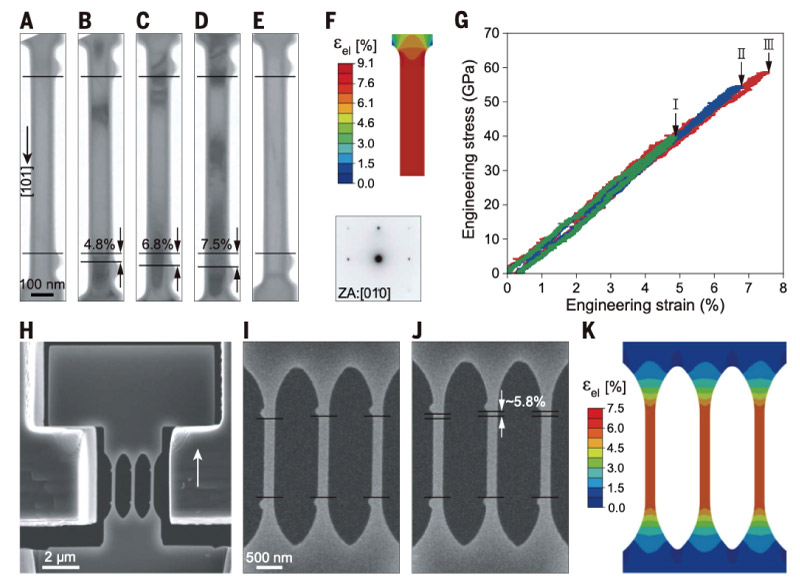“ ‘Smaller is stronger.’ Nanostructured materials such as thin films, nanowires, nanoparticles, bulk nanocomposites, and atomic sheets can withstand non-hydrostatic (e.g., tensile or shear) stresses up to a significant fraction of their ideal strength without inelastic relaxation by plasticity or fracture. Large elastic strains, up to ∼10%, can be generated by epitaxy or by external loading on small-volume or bulk-scale nanomaterials and can be spatially homogeneous or inhomogeneous. This leads to new possibilities for tuning the physical and chemical properties of a material, such as electronic, optical, magnetic, phononic, and catalytic properties, by varying the six-dimensional elastic strain as continuous variables. By controlling the elastic strain field statically or dynamically, a much larger parameter space opens up for optimizing the functional properties of materials.“
– Cited from: Ju Li, Zhiwei Shan, and Even Ma, MRS Bulletin, volume 39, pages 108–114 (2014)
For example, diamond is the hardest material in nature, but the bulk form of it has a low ductility (i.e., it cannot be deformed to a high strain without fracture). Recently, researchers have found that extremely large elastic tensile strain (up to 9.7%) can be achieved in micro-fabricated diamond bridges. This is of particular importance as such deep elastic strain engineered diamond may enable diamond-based electronic and optoelectronic devices that have extraordinary performance.

Publication:
[3] Stress Sensitivity Origin of Extended Defects Production Under Coupled Irradiation and Mechanical Loading, Miao He, Yang Yang, Fei Gao, and Yue Fan, Acta Materialia, (2023), 118758.

[2] Ion-beam radiation-induced Eshelby transformations: The mean and variance in hydrostatic and shear residual stresses, Yongchao Chen, Qing-Jie Li, Alexander D. O’Brien, Yang Yang, Qi He, David A. Bloore, Joost J. Vlassak, Ju Li, Extreme Mechanics Letters, (2023), 59, 101970.
[1] Achieving large uniform tensile elasticity in microfabricated diamond, Chaoqun Dang†, Jyh-Pin Chou†, Bing Dai†, Chang-Ti Chou†, Yang Yang, Rong Fan, Weitong Lin, Fanling Meng, Alice Hu, Jiaqi Zhu, Jiecai Han, Andrew M. Minor, Ju Li, Yang Lu, Science, 371, 76–78 (2021)